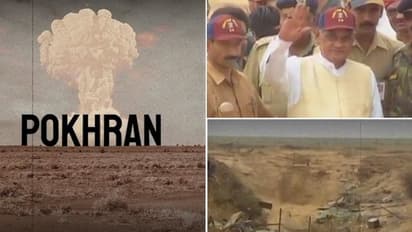'Gratitude to brilliant scientists': PM shares clip of 1998 Pokhran nuclear tests on National Technology Day

Synopsis
The successful nuclear tests conducted in the Pokhran area of Rajasthan in 1998 are one of the most defining milestones in India's path in scientific and technical growth. Atal Vihari Bajpai, India's then-prime minister, led the endeavour to make India an independent nuclear power. The nuclear tests, known as Pokhran-II, took place on May 11, 1998.
On National Technology Day, Prime Minister Narendra Modi took to Twitter to "show thanks to our outstanding scientists." "Today, on National Technology Day, we offer thanks to our outstanding scientists and their work that resulted to the successful Pokhran tests in 1998," the Prime Minister wrote with a video. He further said, "We recall with pleasure Atal Ji's remarkable leadership, which demonstrated outstanding political daring and statesmanship."
On May 11, India commemorates National Technology Day, as it was on this date in 1998 that the country successfully performed the renowned Pokhran nuclear tests.
The successful nuclear tests conducted in the Pokhran area of Rajasthan in 1998 are one of the most defining milestones in India's path in scientific and technical growth. Atal Vihari Bajpai, India's then-prime minister, led the endeavour to make India an independent nuclear power. The nuclear tests, known as Pokhran-II, took place on May 11, 1998.
With other nuclear powers rejecting India's participation, a dedicated team of scientists, researchers, and engineers had to work on the project. India kept the mission a secret in order to avoid international attention and condemnation.
Pokhran nuclear experiments were carried out at the Indian Army's Pokhran Test Range. To conduct a successful test, five explosions were carried out. Dr. APJ Abdul Kalam, India's "missile man," was the driving force behind the Pokhran tests.
Also Read | National Technology Day 2022: Know history, significance, theme of the year and more
After the successful test, India's then-Prime Minister Atal Bihari Vajpayee called the country a nuclear power. The expedition was called Operation Shakti and was carried out in secret since the other five members of the 'nuclear club' were opposed to its spread.
The mission's achievement is regarded a significant milestone in India's history because the technology employed in the nation over two decades ago was not completely ready to carry out the operation. On May 11, India honours National Technology Day with the goal of reaching the same or better heights of achievement in future technical and scientific activities of any sort.
Also Read | National Technology Day 2022: Quotes, wishes, messages, images you can share
Stay updated with the Breaking News Today and Latest News from across India and around the world. Get real-time updates, in-depth analysis, and comprehensive coverage of India News, World News, Indian Defence News, Kerala News, and Karnataka News. From politics to current affairs, follow every major story as it unfolds. Get real-time updates from IMD on major cities weather forecasts, including Rain alerts, Cyclone warnings, and temperature trends. Download the Asianet News Official App from the Android Play Store and iPhone App Store for accurate and timely news updates anytime, anywhere.